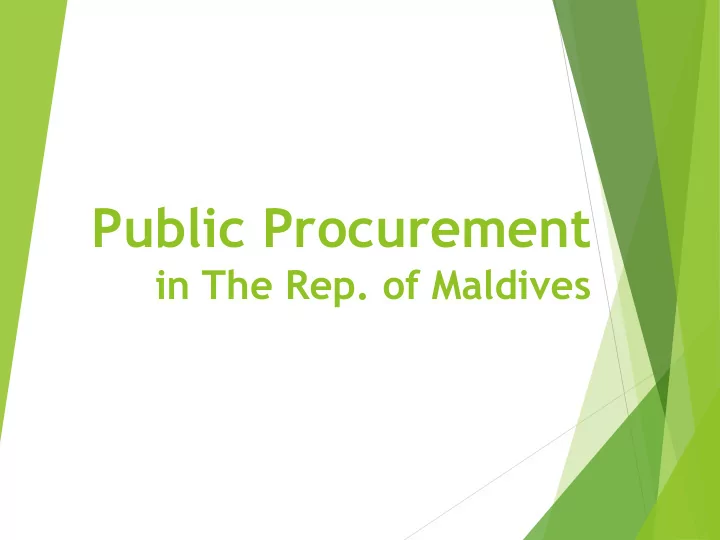

Public Procurement in The Rep. of Maldives
Introduction Tender Evaluation Section
Definition of Procurement What is Procurement? ‘Acquisition by purchase, rental, lease, hire purchase, license, franchise or any other contractual means, of any types of goods, works or services or any combination of goods, works or services’
Public Sector Procurement What is special about Public Procurement?
Public Sector Procurement What is special about Public Procurement? - Source of funds is the principal difference - government funds are often tax revenues, donor funds - Therefore there is a need to be accountable to Parliament, civil society and donors - Uniformity of systems and procedures across the public sector
Government Responsibilities for Procurement
Legal Framework for Public Procurement Law on Public Finances – Law No. 3/2006 covers public expenditure limited detail on procurement may need small revision to accommodate procurement regulations Government Financial Regulations Chapter 8 (and certain other clauses) on procurement to be repealed new chapter drafted ( chapter 10) remaining regulations will be revised separately
What do the regulations apply to? All procurement by government agencies using public moneys Public enterprises NOT covered Exceptions for: defence or national security grants/credits where donor rules apply private financing and concessions
Objectives of Public Procurement Transparency and accountability Economy, efficiency and competition = value for money Promote private sector participation through fair and non-discriminatory treatment of tenderers
Who authorises procurement? Approvals authority can be: Accountable officer – low value contracts Agency Tender Committees – where authorised by Financial Controller up to specified level of authority National Tender Board – unlimited authority
Levels of Authority Accountable Officer: value of procurement does not exceed MRf 25,000 ( USD 1,621) Agency Tender Committee: value of procurement does not exceed MRf 1,500,000 (USD 97,276) National Tender Board: all other procurement
Role of Approvals Authority Ensure procurement is compliant with the Regulations Authorise certain stages of procurement process: Invitation documents Evaluation reports Contract amendments Also authorise use of single source/emergency procurement
National Tender Board Previously known as Tender Evaluation Board Run by Ministry of Finance and Treasury Chairperson and seven members – appointed by President At least 2 members from private sector – not permitted to tender while serving on Board Secretary – Head of Tender Evaluation Section To ensure that all procurement submitted for prior authorisation is in accordance with Regulations
Agency Tender Committees May be established where procurement workload and capacity are high Subject to government policy on centralisation/ decentralisation Minister to authorise establishment Not in all government agencies – levels may differ To ensure that all procurement submitted for prior authorisation is in accordance with Regulations
Composition of Agency Tender Committees Chairperson and 2-6 members Appointed by Accountable officer Selected for range of technical skills and knowledge Government agencies must establish Procurement Unit to support Tender Committee Head acts as Secretary
Who conducts procurement? Lead government agencies – specialised and common use items Government agencies themselves – up to level of authority Tender Evaluation Section – all other items Requisitioning agency will always: Plan procurement Authorise funding Provide technical inputs/assist with evaluation
Mode of Procurement Most of the government agencies uses SAP-Materials Management Module (MM) to procure their goods and services MM has been implemented to more 70% of the government agencies in term of the spending (budget) Standardize Purchase order throughout the implemented agencies Centrally Managed by the Ministry of Finance and Treasury
Monitoring and Observation of the Public procurement Public Procurement Section is not yet established Currently there are no mechanism to monitor public procurement in all government agencies But through SAP- Materials Management Module most of the agencies based in Male’, will be monitored though this system If the government agencies do not follow the rules and regulations of the public procurement, they will be reported to Anti-Corruption Commission directly
New initiative for Modernizing the Public Procurement in Maldives (Continued…) The PFM Strengthening Project (2014~2019) contains specific component for Improving the control environment where the objective is to strengthen the country procurement management system by: Review and updating of the Financial Regulations including the Procurement Chapters; standardization and establishing procurement benchmarks based on international good practice; setting up of the procurement policy section; establishment of complaints handing system; strengthening the tender evaluation section within the MOFT-based National Tender Board;
New initiative for Modernizing the Public Procurement in Maldives developing procurement manuals and standard operating procedures for harmonizing the procurement practices across the country; reviewing and updating the standard bidding documents; establishment of institutionalized and sustainable procurement training mechanism via the Civil Service Commission; Professionalize and introduction of procurement cadre in the civil services.
Role of the Auditor general’s office AGO reports directly to parliament and public accounts committee Under the public finance law, each accountable office has to be audited every year and audit report has to be sent to the parliament on or before 31 st May of the following year Copy of the same report is sent to the President, Minister of Finance and Treasury and audited entity In the year 2013, MVR 1.4 billion worth of procurement of goods and services has been made against the prescribed guidelines in the public finance regulation
Recommend
More recommend